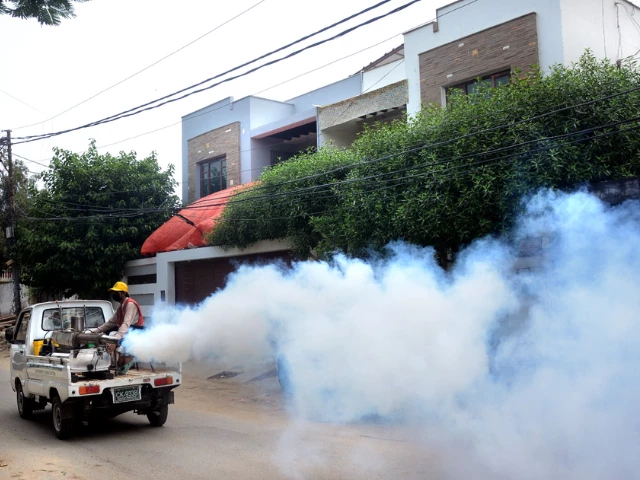Vector-borne diseases continue to plague the city
Lack of fumigation against flies, mosquitos have allowed the spread of gastric diseases and dengue

Where garbage dumps on roads and in alleys constantly expose residents to filth and unhygienic conditions, during the monsoon season, stagnant water on filthy streets acts as a breeding ground for flies and mosquitoes leading to the spread of various diseases.
According to Professor Dr Naveed Rab Siddiqui, an entomologist, Karachi is home to five types of flies: house fly, drain fly, flesh fly, blue bottle fly, and green bottle fly, which appear especially during the rainy season because it coincides with fruit cultivation.
“A house fly lays around 500 eggs every three to four days and carries germs that get transferred to food through their mouths and legs. This leads to contamination and causes various stomach-related diseases including diarrhea, dysentery, and cholera. With the onset of the monsoon in Karachi, the breeding of dengue- and malaria-carrying female mosquitoes has begun. The dengue and malaria season typically lasts from August to mid-December. Every year, the rainy season provides ideal conditions for the larvae to hatch from eggs laid by these mosquitoes. Insecticide spraying is essential to eliminate these mosquitoes,” emphasized Dr Siddiqui.
Read More: Contaminated water deepens health crisis
Similarly, expert physician Dr Aftab Hussain told The Express Tribune that with the beginning of the monsoon season across Karachi and Sindh, there was a rapid increase in mosquitoes and flies responsible for causing diseases. “Mosquitoes spread dengue and malaria, while flies contribute to the spread of cholera. So far, neither the Health Department nor provincial or local governments have launched any spray campaign for drainage of rainwater or eradication of dengue. They have not taken any notable measures in Karachi over the past four years to carry out anti-dengue spraying,” criticized Dr Hussain.
From 2020 to August 2024, more than 37,000 cases of dengue have been reported across Sindh, and 96 people have died from the virus in the last four years. According to statistics released by the Health Department’s Vector-Borne Disease Unit, 4,318 people in Sindh, including Karachi, were infected with dengue in 2020, and 3 died. In 2021, 6,739 people were infected and 28 died. Despite this, no mosquito-killing spray campaign was launched in Karachi or elsewhere in Sindh. As a result, dengue worsened in 2022, infecting 22,274 people and causing 64 deaths. In 2023, 2,800 people contracted the virus, but no deaths were reported. So far in 2024, 892 dengue cases have been reported, with one death from Karachi’s Central District.
Health experts have expressed concern that if no effective campaign is launched in the coming months of 2025, dengue could take a dangerous turn across Sindh by December 2025. Dengue wards are still not operational in government hospitals across the province, while treatment in private hospitals is extremely expensive and unaffordable for poor individuals.
District health officers in Karachi claim that they lack sufficient Vector-Borne Disease staff for fumigation. This staff does not report administratively to district health officers. Each district has only one or two personnel assigned, which is insufficient for a spraying campaign in Karachi.
Also Read: Flooded by neglect
Dr Mushtaq Shah, Director of the Dengue Control Program under the Vector-Borne Disease Unit, claimed that district health officers provided technical assistance to local governments for eliminating mosquitoes and the larvae that hatch from female mosquito eggs.
“The spraying campaign is under the supervision of the district health officers, and steps are being taken to launch it. In some areas, the campaign has already started,” said Dr Shah. On the other hand, officials from the Health Department stated that dengue prevention wards and other facilities are gradually being made functional in government hospitals.




















COMMENTS
Comments are moderated and generally will be posted if they are on-topic and not abusive.
For more information, please see our Comments FAQ